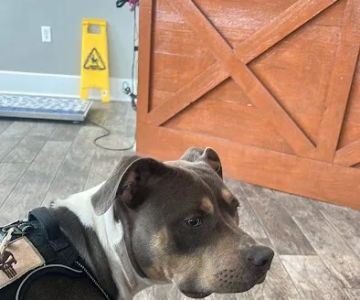Managing Your Pet’s Health As They Age
As your pet ages, their health needs change, and it’s crucial to be proactive about managing their well-being. Just like humans, pets experience physical and mental changes as they grow older, and being prepared can help you ensure that they live a long, happy, and healthy life. In this article, I’ll share some tips on managing your pet’s health as they age, from dietary changes to regular veterinary visits.
1. Regular Veterinary Checkups
One of the most important things you can do to ensure your aging pet’s health is regular veterinary visits. As pets age, they can develop health issues that may not be immediately obvious. A veterinarian can detect problems early through routine examinations, blood tests, and vaccinations, keeping your pet in the best possible health.
Annual or bi-annual checkups are recommended for senior pets. These visits can help catch issues like arthritis, dental disease, or kidney problems early. Regular checkups can also help your vet create a tailored wellness plan, including diet and exercise recommendations, to address your pet’s specific needs.
2. Adjusting Their Diet
As your pet ages, their nutritional needs change. Older pets often require fewer calories and more fiber to support their digestive health, as well as specific nutrients to help maintain joint, kidney, and heart function. A balanced, age-appropriate diet is essential for managing your pet's health.
Senior pets may also suffer from dental issues that make it harder for them to chew, so consider switching to softer food or adding wet food to their diet. Many pet food brands now offer formulas designed for senior pets, which can address specific health concerns such as weight management, mobility, and digestive health.
3. Exercise and Weight Management
Regular exercise is crucial for senior pets, though the intensity and duration should be adjusted to suit their age and physical abilities. While your pet may not have the energy they did in their youth, it’s important to provide them with low-impact exercises, such as short walks or gentle playtime, to keep their muscles and joints strong.
Maintaining a healthy weight is equally important, as obesity can exacerbate joint pain and lead to other health complications. If you’re unsure whether your pet is at a healthy weight, ask your vet for guidance. They can help you adjust your pet’s food intake and exercise regimen to keep them at an ideal weight.
4. Mental Stimulation
Older pets, just like humans, can experience cognitive decline. You may notice that your pet is less responsive to commands or seems confused in familiar surroundings. Keeping your pet mentally stimulated can help slow down cognitive decline and keep them sharp.
Interactive toys, puzzle feeders, and simple training exercises can provide mental stimulation. Regular socialization with other pets or people, as well as exposure to new experiences, can also help keep your pet’s mind active and engaged.
5. Grooming and Skin Care
As pets age, their skin and coat often become less vibrant and healthy. Regular grooming is essential to keep their coat clean and healthy, but it also gives you the opportunity to check for any abnormalities like lumps, skin irritations, or dry patches. Older pets may also develop sensitivities, so make sure to use pet-friendly grooming products that are gentle on their skin.
Additionally, older pets may suffer from arthritis or joint pain, making it more difficult for them to groom themselves. You can assist by brushing your pet regularly and helping with their hygiene needs to keep them comfortable.
6. Consider Alternative Therapies
In addition to traditional veterinary care, there are many alternative therapies that can improve your pet’s quality of life. For example, acupuncture and physical therapy are often used to relieve pain and improve mobility in senior pets with arthritis. Talk to your vet about whether these therapies are appropriate for your pet.
7. Ensuring Comfort and Safety at Home
As your pet gets older, they may experience physical limitations, such as reduced mobility or vision impairment. Making small adjustments at home can help improve your pet’s comfort and safety. For example, providing a soft, warm bed can help soothe aching joints, and using ramps or stairs can make it easier for them to access higher places like the couch or car.
Ensuring that your pet’s environment is safe is also important. Remove hazards like slippery floors or obstacles they could trip over. If your pet has trouble hearing or seeing, ensure they are able to get around your home safely, and try to keep the environment as familiar and comfortable as possible.
By being proactive and attentive to your pet’s needs as they age, you can help ensure that they continue to enjoy a high quality of life. Regular veterinary visits, appropriate diet and exercise, mental stimulation, and home safety measures all contribute to your pet’s health and well-being.
Managing Your Pet’s Health with Hidden Brook Veterinary
At Hidden Brook Veterinary, we understand the importance of managing your pet’s health as they age. Our experienced team is dedicated to providing the highest level of care for senior pets, ensuring that they live long, healthy, and happy lives. We offer personalized wellness plans, senior pet health checks, and alternative therapies to address the unique needs of aging pets.
Contact us today to schedule a consultation and learn more about how we can help you care for your aging pet. Together, we can keep your beloved companion healthy and thriving well into their golden years.











